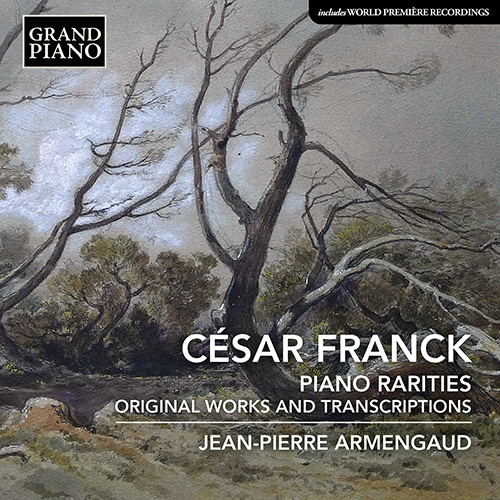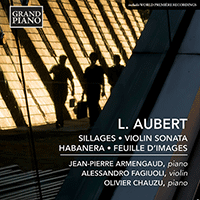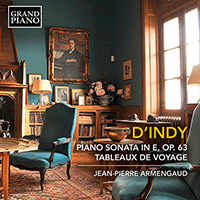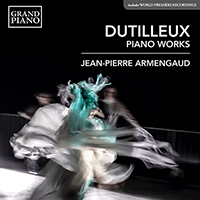
About this Release
“The music of César Franck has helped to shape me as a musician and has accompanied me throughout my life. I had the opportunity to work on Prélude, Choral et Fugue based on a score with fingering by the great pianist Yves Nat. With the passing of time, I have to come to particularly like the showers of arpeggios of the Prélude, which are like vibrations of memory of the notes of the main theme. It makes one think a little of Marcel Proust’s “Remembrance of Things Past” novels. Les Variations symphoniques is one of the first works I played with an orchestra. I have always felt that there was a profound search for originality in the form and flexibility in Franck’s writing, with an expressive sensitivity that is often both stormy and inquisitive.” — Jean-Pierre Armengaud
FRANCK, CÉSAR (1822–1890)
Piano Rarities
- Jean-Pierre Armengaud, piano
Few composers have enjoyed a late flowering to compare with that of César Franck. Many of the great works in this recording were composed during his final decades and still stand today as powerful representatives of French music in the post-Franco-Prussian War period. The influence of Wagner can be heard in the poetic evocations of Les Éolides, while the magnificent Prélude, Choral et Fugue, much admired by Liszt, reinterprets well-known Baroque-era genres into an unforgettably expressive Romantic aesthetic. Widely acknowledged as one today’s great interpreters of French music, Jean-Pierre Armengaud presents an album of rarities composed for piano by Franck and arrangements of the composer’s works by distinguished musicians from the early 20th century.
Tracklist
|
Prélude, fugue et variation in B Minor, Op. 18, M. 30 (arr. H. Bauer for piano) (1860) (00:04:00 )
|
|
1
Prélude: Andantino cantabile (00:03:43)
|
|
2
Prélude: Lento (00:00:59)
|
|
3
Fugue (00:03:22)
|
|
4
Variation (00:04:04)
|
|
5
Les Éolides, M. 43 (arr. G. Samazeuilh and J.-P. Armengaud for piano) (1876) (00:14:53)
|
|
6
Prière, Op. 20, M. 32 (arr. B. Selva for piano) (1862) (00:14:12)
|
|
Prélude, choral et fugue (Prelude, Chorale and Fugue), M. 21 (1884) (00:18:00 )
|
|
7
Prélude - (00:05:04)
|
|
8
Choral - (00:06:15)
|
|
9
Fugue (00:08:48)
|
|
10
Ruth, églogue biblique, Part I: Introduction (version for piano) (1871) (00:07:33)
|
The Artist(s)
 Jean-Pierre Armengaud is considered a leading interpreter of French music and a specialist in impressionist and expressionist repertoire, and is renowned for his ‘fluidly supple playing, his round and mellow tone’ (Classica). He has recorded several complete collections, of piano music by Debussy, Satie, Roussel, Poulenc, Dutilleux and Denisov. Armengaud has appeared in major concert halls around the world, performing in over 40 countries. His albums for Naxos and Grand Piano feature music by Debussy, Roussel, Poulenc, Aubert, d’Indy and others, and he has a particular interest in Henri Dutilleux. He has been director for musical programming at Radio France and is associate professor at the ParisSorbonne University and professor emeritus at the University of Évry Val d’Essonne at Paris-Saclay University.
Jean-Pierre Armengaud is considered a leading interpreter of French music and a specialist in impressionist and expressionist repertoire, and is renowned for his ‘fluidly supple playing, his round and mellow tone’ (Classica). He has recorded several complete collections, of piano music by Debussy, Satie, Roussel, Poulenc, Dutilleux and Denisov. Armengaud has appeared in major concert halls around the world, performing in over 40 countries. His albums for Naxos and Grand Piano feature music by Debussy, Roussel, Poulenc, Aubert, d’Indy and others, and he has a particular interest in Henri Dutilleux. He has been director for musical programming at Radio France and is associate professor at the ParisSorbonne University and professor emeritus at the University of Évry Val d’Essonne at Paris-Saclay University. The Composer(s)
 Born in Liège in 1822, César Franck was originally intended by his father for a career as a virtuoso pianist. In Paris his nationality excluded him at first from the Conservatoire, where he eventually failed to achieve the necessary distinction as a performer, turning his attention rather to composition. In 1846 he left home and went to earn his living in Paris as a teacher and organist, winning particular fame in the second capacity at the newly built church of Ste Clotilde, with its Cavaillé-Coll organ. He drew to himself a loyal and devoted circle of pupils and in 1871 won some official recognition as the nominated successor of Benoist as organ professor at the Conservatoire. A man of gentle character, known to his pupils as ‘Pater seraphicus’, he exercised considerable influence through his classes and performances although he remained, as a composer, something of an outsider in a Paris interested largely in opera.
Born in Liège in 1822, César Franck was originally intended by his father for a career as a virtuoso pianist. In Paris his nationality excluded him at first from the Conservatoire, where he eventually failed to achieve the necessary distinction as a performer, turning his attention rather to composition. In 1846 he left home and went to earn his living in Paris as a teacher and organist, winning particular fame in the second capacity at the newly built church of Ste Clotilde, with its Cavaillé-Coll organ. He drew to himself a loyal and devoted circle of pupils and in 1871 won some official recognition as the nominated successor of Benoist as organ professor at the Conservatoire. A man of gentle character, known to his pupils as ‘Pater seraphicus’, he exercised considerable influence through his classes and performances although he remained, as a composer, something of an outsider in a Paris interested largely in opera. 



 Grand Piano has gained a reputation for producing high quality recordings of rare keyboard gems. Dedicated to the exploration of undiscovered piano repertoire, the label specialises in complete cycles of piano works by many lesser-known composers, whose output might otherwise have remained unknown and unrecorded.
Grand Piano has gained a reputation for producing high quality recordings of rare keyboard gems. Dedicated to the exploration of undiscovered piano repertoire, the label specialises in complete cycles of piano works by many lesser-known composers, whose output might otherwise have remained unknown and unrecorded.






